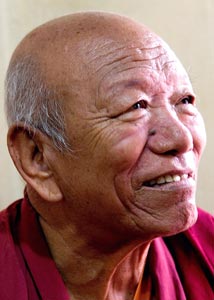Name: Ngawang Choseng
(Alias: No)
Gender: Male
Interview Age: 73
Date of Birth: 1934
Birthplace: Gerdha - Lhatse, Utsang, Tibet
Year Left Tibet: 1962
Profession: Monk
Monk/Nun: Currently
Political Prisoner: No

Interview No.: 91
Date: 2007-07-07
Language: Tibetan
Location: Lugsung Samdupling Settlement, Bylakuppe, Karnataka, India
Categories: Buddhist Traditions
Keywords: Bylakuppe -- early life in , childhood memories, Chinese -- first appearance of, Chinese rule -- life under, escape experiences, monasteries -- relationship with , monastic life, refugee in India -- life as, thamzing/struggle sessions, Utsang
Summary:
Ngawang Choseng was born in the village of Gerdha in Utsang province. His family was a tenant of the Lhatse Chodhe Monastery and, as a form of tax, they sent Ngawang Choseng to the monastery to become a monk when he was 7 years old. His father was Chipon, the keeper of the horses of the monastery.
At the monastery Ngawang Choseng learned the Tibetan language and basic Buddhist scriptures. When he reached 13 years of age, he started studying Buddhist philosophical debates, which became the main focus of his education. At the age of 28, he went to Lhasa and enrolled in Sera Monastery.
After the Chinese invasion, he witnessed the arrest and public beatings of many monks. Ngawang Choseng returned to his village after Lhasa was attacked in 1959. Ngawang Choseng made his escape to India in 1962 with three other monks. Initially, Ngawang Choseng worked on road construction and later settled in Bylakuppe where he joined 300 other monks who labored to build Sera Monastery in Bylakuppe.
Interview Team:
- Martin Newman (Interviewer)
- Lhakpa Tsering (Interpreter)
- Jeff Lodas (Videographer)

